Our News, Your News
By Nicky Harman, October 1, '17
I've written a few blogs to promote my translation of Jia Pingwa's 《高兴》, published by Amazon Crossing as "Happy Dreams". Here's one, for Bookanista. We're also running at least two live events in London. Watch this space.
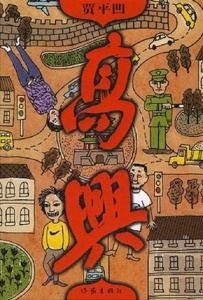
By David Haysom, September 30, '17
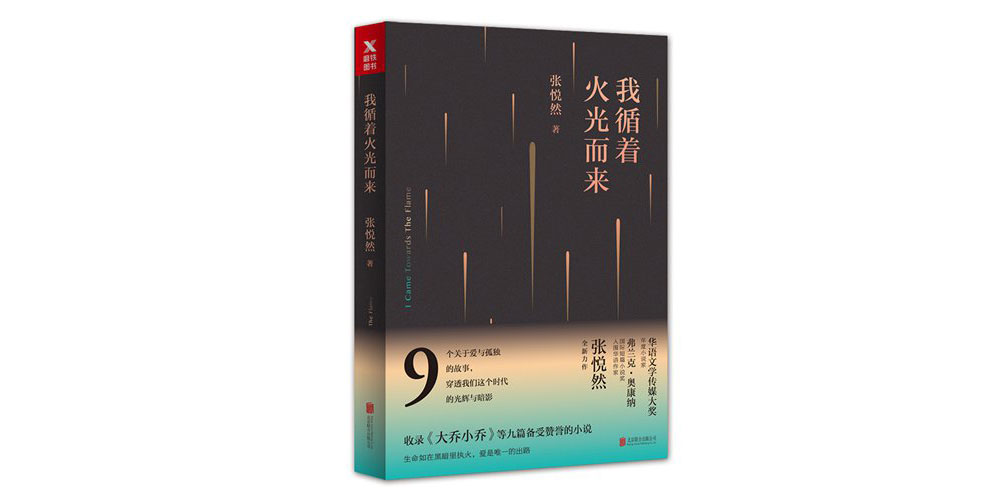
Following last year's novel《茧》(Cocoon), Zhang Yueran has a new volume of stories entitled 《我循着火光而来》 (I Came Towards the Flame). An event to mark the launch last Sunday featured Zhang Yueran in conversation with Su Tong, and various other appearances by video – including author Lu Nei and translator (and friend of Paper Republic!) Anna Gustafsson Chen.
More…
Looking back on how my books have roamed the world, I see there are three factors: translation, publication and readers. I’ve noticed that in China discussions about Chinese literature in a world context focus on the importance of translation, and of course, translation is important, but if a publisher doesn’t publish, then it doesn’t matter how good a translation is, if it’s going to be locked in a drawer, old-style, or, these days, stored on a hard drive. Then there are the readers. If a publisher publishes a book, and the readers don’t pick up on it, then the publisher will lose money and won’t want to publish any more Chinese literature. So, these three factors – translation, publication and readers – are all essential.
Set in China’s 21st-century Inner Mongolia, the novel is a semi-autobiographical tale by Guo Xuebo (郭雪波), a Mongol who grew up speaking the language of his people. It comprises three distinct but intertwined narratives: A spiritual journey, in which the narrator — ostensibly the author — seeks his Shamanic roots, long obscured in post-1949, officially atheist China; vignettes from the Mongolian adventures of Henning Haslund-Christensen, born to a Danish missionary family in the Chahar grasslands in 1896, and real-life author of the anthropological masterpiece Men and Gods in Mongolia; and the tribulations of Teelee Yesu, a modern-day fictional Mongol herdsman, considered by many to be the village idiot, whose very survival is threatened by desertification and the machinations of a coal mining company that covets the traditional pastures of the Mongols.
This excerpt from Mongolia (蒙古里亚) treats comically two taboo topics almost never mentioned in Chinese news reports or fiction: The exploitation of traditional Mongolian pasture lands by ruthless coal mining firms, and the use of self-immolation by China’s ethnic minorities to protest government policies aimed at acculturation.
Chinese authorities have recently blocked various Islam-related words invented by Chinese netizens. The ban comes after consecutive online controversies on the topic of Chinese Muslims and Islam in China; the tone of the discussions reportedly “undermines ethnic unity.”
Earlier this year, I saw a standard contract that a major Beijing publisher uses with its authors and that no doubt reflects practice all across China. Provision Two of the contract lists the items to be censored: any language that violates the honor or interests of the state, harms national unity, leaks state secrets, insults the nation’s outstanding cultural traditions, and so on; a catch-all category at the end says, “or that violates other regulations.” Provision Five spells out who will decide which words in a text are to be censored:
Publisher has the right, in accordance with the publishing laws and regulations of the State, to make deletions, revisions, and additions to the Work. If changes are major, Publisher should consult with Author to obtain agreement. If Author refuses to revise or, after repeated revisions, has failed to satisfy Provision Two of this agreement, Publisher has the right to cancel the contract.
In the Young Readers section, three of the six finalists were translations - details of all nominated books in this section on World Kid Lit Month
DEADLINE EXTENDED: Thursday 30 November 2017
To celebrate the tenth anniversary issue of Cha and to mark the twentieth anniversary of Hong Kong's handover, we are hosting Cha International Poetry Prize 2017, in collaboration with PEN Hong Kong.
Issue Four of Freeman's magazine is out, with A Yi's story "An Unsolved Case", translated by Jeremy Tiang, and Xu Zechen's "The Dog's Been Barking All Day", translated by Eric Abrahamsen.
For three decades, China has been running what amounts to a huge social experiment: a one-child policy that limits each family to have only one offspring. The policy has led to a greater gender imbalance than the global average. In 2015, Beijing relaxed this policy to allow two children per family. But in Maggie Shen King’s debut novel, An Excess Male, China continues to face this real-world dystopian scenario.
In an alternate timeline set in the near future, the one-child policy has continued for several decades, radically changing the social structure. In this world, a woman can take up to three husbands, depending on how “patriotic” a family decides to be and how desperately in need of cash they are.
By Nicky Harman, September 13, '17

Bookriot: A Conversation Between Literary Translators Marian Schwartz and Nicky Harman
Marian Schwartz is the award-winning translator of “Russian crime queen” Polina Dashkova’s first book to be translated into English, Madness Treads Lightly. She is the principal English translator of the works of Nina Berberova, and translated the New York Times bestseller The Last Tsar by Edvard Radzinsky, as well as classics by Mikhail Bulgakov, Ivan Goncharov, Yuri Olesha, and Mikhail Lermontov.
Nicky Harman, winner of the Mao Tai Cup People’s Literature Chinese-English translation prize 2015 and the 2013 China International Translation Contest, Chinese-to-English section, and is the translator of Happy Dreams by Jia Pingwa, one of China’s most celebrated writers.
We’ve brought them together to talk about their process, communicating with their (still living) authors, difficulties in their work, and more...
By Nicky Harman, September 11, '17
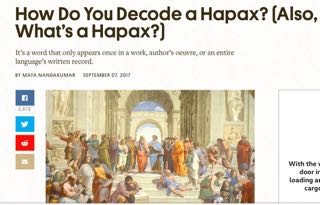
Here's a nice article I came across in Atlas Obscura about authors (Maya Nandakumar gives mainly classical ones as examples) who invent their own words. Made me think of a few living Chinese authors who seem to be similarly inventive with words or expressions ... Jia Pingwa comes to mind. On the other hand, when I can't find certain mystifying expressions anywhere else online, I often wonder if it's really the author's own invention or just that certain varieties of language (local dialects) are poorly represented on the internet....
By Nicky Harman, September 10, '17

In Sheffield on Monday 16th October? Come and hear Nicky Harman and Michelle Deeter debate their competing translations of an Aman Song short story, in "Forty Nine Degrees – Chinese Translation Slam." In the heat of a traffic jam, a man and woman get stuck in a taxi on their way to visit the woman’s parents. She’s a graduate with few prospects; he’s the man her parents desperately want her to marry. Will they make the train? With host Deborah Smith from Tilted Axis Press. 7:30pm.
http://www.offtheshelf.org.uk/…/forty-nine-degrees-chinese…/
First enfeoffed by Qing Emperor Qianlong in 1758, this Uyghur dynasty in northeastern Xinjiang eventually boasted a line of eleven monarchs, popularly known as the “King of Kuqa” (库车王). Kuqa was an ancient Buddhist kingdom located on the branch of the Silk Road that ran along the northern edge of the Taklamakan Desert, but to most Chinese today, the term signifies the city of Kuche. The last in the line, Dawut Makosuti (达吾提·麦合苏提), passed away in 2014.
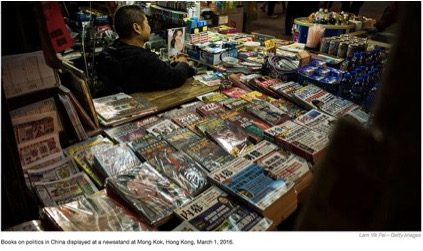
Geremie Barmé takes a look at the recent decision of Cambridge University Press to reinstate content deleted from the online version of its China Quarterly available in China:
Chinese censorship has come a long way.
During his rule in the second century B.C.E., the First Emperor 秦始皇 of a unified China, Ying Zheng 嬴政, famously quashed the intellectual diversity of his day by ‘burning the books and burying the scholars’ 焚書坑儒. He not only got rid of troublesome texts, he deleted their authors and potential readers as well.
Jun Liu talks about co-translating with Bruce Humes - "Confessions of a Jade Lord" (时间悄悄的嘴脸), by Uyghur author Alat Asem (阿拉提·阿斯木), depicting the life of a big-shot jade trader based in Xinjiang, Northwest China.
“Singapore used to be like a linguistic tropical rain forest — overgrown, and a bit chaotic but very vibrant and thriving,” said Tan Dan Feng, a language historian in Singapore. “Now, after decades of pruning and cutting, it’s a garden focused on cash crops: learn English or Mandarin to get ahead and the rest is useless, so we cut it down.”
By Bruce Humes, August 27, '17
Glossing Africa is a fascinating piece on “glossing” — different ways to do it, and what it signifies when it is (or is not) employed. In this piece, glossing refers to practices for clarifying an indigenous term by providing a glossary, footnotes, inserting a brief definition, etc.
Of course, we translators also frequently have to decide whether to gloss or not. In Chi Zijian’s Last Quarter of the Moon, for instance, I counted about 125 Evenki terms, including for proper names, place names and unique aspects of Evenki culture. More recently, Liu Jun and I co-translated Confessions of a Jade Lord by Alat Asem, in which there are many Uyghur and Arabic terms.
Chimamanda Ngozi Adichie, the popular Nigerian author now splitting her time between the US and Nigeria (and one of the rare contemporary African authors to have several novels available in Chinese), is definitely not a fan of glossing:
There’s a part of me that just deeply resents the fact that there’re many parts of the world where the fiction that comes from there is read as anthropology rather than as literature. And increasingly that kind of anthropological reading then means that… you’re explaining your world rather than inhabiting your world.
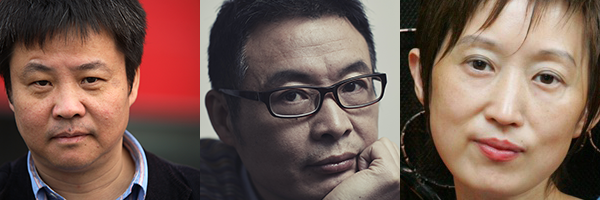
"This is a powerful moment in Chinese literature: Contemporary writers are wrestling with the complex legacies of China’s past and its changing present. To show the breadth of contemporary Chinese fiction, we’ve selected six authors to profile" : Yu Hua, Mai Jia, Liu Zhenyun, Xu Zechen, Sheng Keyi, and Chen Ran.
By Nicky Harman, August 24, '17
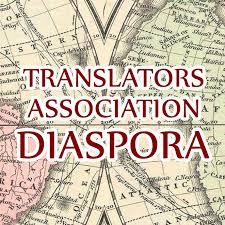
I came across this fascinating discussion on the Facebook page of the (UK) Translators Association Diaspora and with David Warriner's permission am re-posting it here.
22 August 2017, from David Warriner:
Here's a challenge for the hive mind: I'm translating a literary crime thriller set in coastal Quebec that's peppered with local flavour, mainly through religious swearing. The main challenge with the novel is going to be keeping that local flavour through the characters' speech while maintaining readability for a predominantly British audience. Most of the expressions are used so frequently, it's not really an option to keep them in French. And they're peppered so liberally throughout the characters' speech, they're not really swear words anymore. Anyway, I'm hoping to gather some ideas for religious almost-swear words along the lines of Sweet bejesus! and Christ on a bike! for tackling gems such as Saint-ciboire de câlisse! For context, think middle-aged, salt-crusted fisherman propping up the bar at the pub on the docks.
Thanks in advance for any ideas."
Click "Leave a Comment" to read the responses
More…
When I first came to live in China in 2008 I was 22, and I spent most of my twenties in Beijing. In that Olympic summer, everyone was talking of how China might change the world. But to me it was how young Chinese are changing that was the real transformational story, with the deepest long-term consequences for the future of China and us all. Now I’m 31, and the so-called “youth” are a different generation entirely. But for those born between 1985 and 1990 — six of whose stories I follow in the book — I think of them as a transitional generation that encapsulates much of the change China is going through. A wedge generation, slowly prising China open but still stuck themselves.
24 日 11:20-11:50
场所:W1 B02 (书展内)
主持:人民出版社
《习近平讲故事》英文版与施普林格签约仪式 (Be there. Or else.)
By Bruce Humes, August 14, '17
Each year there are dozens of literary events timed to coincide with the Beijing International Book Fair (Aug 23-27, 2017). They take place both on the fair grounds and throughout the capital, and sponsors include Paper Republic.
As lists of these events-- in Chinese or English -- become available, please list here so that we can all benefit . . .
When asked where I’m from,
I say “Weihai,” even though
nobody knows where it is,
even though I’ve never been to the place.
Chinese events at Edinburgh Int'l Book Festival - incl Liu Zhenyun on 12 Aug, Xiaolu Guo on 20 Aug
At Guanghwa Bookshop, in London, 5 Sept. Read the 4 short stories (or the cheatsheet) before you come, and discuss them with the translators: Nicky Harman, Natascha Bruce, Emily Jones and Helen Wang. Details, and all 4 stories are online now:
Autumn Harvest Chronicle by Liu Ting, tr. Emily Jones
Back-flow River by Jia Pingwa, tr. Nicky Harman
Ying Yang Alley by Fan Xiaoqing, tr. Helen Wang
The Wall by Ho Sok Fong, tr. Natascha Bruce
How Translation Wages Affect the Popularity of Foreign Classics: China’s translators are severely underpaid, and the proof is in the print.
News media and websites are strictly banned from using 38 vulgar phrases, including Chinese for terms such as "country of floating corpses," "green pool," "exploded penis" and "shitizen"
Stunning review, a Bookblast Book of the Week:
Crystal Wedding is an extraordinary and unusual story, (for a Western reader anyhow), and it is told very well. This novel is perfect for readers who relished Margaret Atwood’s The Handmaid’s Tale, Barbara Kingsolver’s The Poisonwood Bible, Kathryn Stockett’s The Help or Kate Chopin’s The Awakening.
Organised by the Writing Chinese team at Leeds University, this is an opportunity for members of the Writing Chinese Book Review Network to meet a featured author - Sheng Keyi - and translator and discuss their work. Over the course of the two days there will be informal sessions devoted to discussion of featured books, as well as to different aspects of fiction and translation, and the craft of reviewing.
The winners of the 10th National Outstanding Children’s Literature Awards 全国优秀儿童文学奖 have just been announced.
From Open Book, June 2017

In a 2015 issue of the New England Review, I published two translations of poems by the excellent Sichuan poet Ya Shi. Like much brilliant poetry, Ya Shi’s work is impossible to paraphrase. My efforts feel incomplete, all my translations filled with infelicities, misinterpretations, and confusions. Still, though, in the translation of “Full Moon Night,” I made what feels to me like a mistake, a moment when my work as a translator loosened and a ghost slipped in.
The TA First Translation Prize is an annual £2,000 prize for a debut literary translation into English published in the UK. The Prize was established in 2017 and generously endowed by Daniel Hahn, with support from the British Council.
Entry to the 2018 Competition is now open.
Deadline to apply is 15 September.
Thanks to a generous seed grant from the Henry Luce Foundation as well as support from the Los Angeles Review of Books, the “China Blog” will be morphing into a freestanding magazine within the magazine. The LARB China Channel will join a set of pre-existing LARB Channels (these vary widely as you can see by clicking here), so we will be in good company.
For weeks, Wang’s fellow Beijingers spoke of the New Year. How in just a few days they’d board the crowded eastbound trains to the capital. How they’d trade Gansu’s dry winds for the Gobi’s sandstorms. But not him. No, he sat every morning on his cliff, looking east, wondering where he could possibly go for the holidays this year. The possibilities were numbered:
By Minjie Chen, Cotsen Library, Princeton:
"One question I repeatedly hear from Chinese immigrant parents and Chinese language teachers in America is, where can they find books that children would enjoy reading at the same time as improving their Chinese...."
(from Writing Chinese, University of Leeds):
--- Welcome to the Reading Chinese Book Review Network, a collaboration between Writing Chinese and our partners at Penguin China and Balestier Press. Reviewers who join the network receive a copy of selected titles, and you can read their reviews by clicking on the images on the webpage. If you are interested in applying to join this network as a reviewer, or if you are a publisher interested in partnering us in this part of the project, please contact us at writingchinese@leeds.ac.uk for more details!
Xinhua News Agency has updated its list of unPC and PC phrases. No-nos include "former Soviet Union" (前苏联) (it's still Soviet Union, Comrade); using "strategy" (战略 zhànlüè) to describe One Belt, One Road (use initiative 倡议 instead), and vulgar terms such as “green tea bitch” (绿茶婊) . . .
I wanted to find what author and critic John Berger called the “quivering wordless thing” beneath the text. I read Western Heaven four times, trying to glimpse Chen’s pre-verbal story and spark a true Berger-esque translation. All I did—besides learn the story inside and out—was wind myself up. I was too new to the game to be attempting the mystic ecstasy Berger called for. I ended up producing a very hi-fi first draft, a wordy monstrosity. I was appalled.
By Bruce Humes, July 20, '17
Sad to learn that the last Jifeng Bookstore (季风), located at the Shanghai Library metro station, will close its doors in January 2018, according to the South China Morning Post. The original opened at Shanghai’s South Shaanxi Road metro station in 1997, and a string of other branches followed over the next decade.
It was during a break from my busy China speaking tour in 2000 about how importers abroad were using the Internet to source China-made goods, that right there in the South Shaanxi station I happened upon a copy of the very naughty 上海宝贝, the first Chinese novel I was to translate (Shanghai Baby). If it hadn’t been banned by then, it was certainly banned quickly thereafter.
The SCMP makes it clear that Jifeng is closing because the Shanghai authorities continually interfere with its efforts to host seminars and the like, events often referred to as 文化沙龙. This puts the few remaining independent booksellers in a bind: Book sales are increasingly monopolized by online vendors and massive Xinhua Bookstores, yet when independents try to branch out into other types of products and services — à la Eslite in Taiwan (诚品书店) — they are thwarted by the local culture department.
The interactive experience of China Literature is another main differentiator – most of its content is serialized, which means writers will often publish work chapter by chapter, sometimes altering plot lines based on suggestions from users. And it’s the discussion forum, which sits alongside the main story, that Pan enjoys most. She remembers a time when many fellow readers wanted two main characters in a novel to become romantically involved. Eventually the author wrote this into the plot. "Serialized works banish the sense of loneliness," Pan said. "When reading on Kindle, you are facing a single terminal; when reading Chinese online novels, you are engaging with a community."
I’ve been mourning Liu Xiaobo for a quarter of a century.
For five intense and eventful years in the late 1980s and early 1990s Xiaobo and I shared what I believe was a real friendship, something special to both of us. We weren’t pengyou 朋友 in that vacuous, Sino-American ‘everyone’s my friend’ kind of way; nor were we gemen’r 哥們兒, that smart ass Beijing version of buddy-buddiness. Much less, thank heavens, did we ever become lao pengyou 老朋友, an accursed expression that, in reality, indicates a long-term association reaffirmed by bonds of mutual benefit, imposing thereby an exploitative emotional burden on both parties. Nonetheless, we were, to use the Beijing argot, tie 鐵, iron-clad.
Starfish Bay Children’s Books is an independent publishing house based in Adelaide, Australia and Auckland, New Zealand, and has published several children’s books translated from Chinese since 2015.
Where shall we meet: At Big Tile Pit, Mud Depression or Puddle of Accumulated Water?
(You'll have to scroll down a bit into the news item)
While Chinese literature has experienced an uphill battle getting published in the English-speaking world, the situation in Spanish- and Arabic-speaking countries has been completely different.
The proliferation of taboo-breaking advertisements is hardly surprising given the leading demographics of online shoppers: young, white-collar professionals with mid-range incomes, as well as high school and university students. In everyday communication, these groups tend to look down on linguistic conventions and seek to subvert them by creating new and surprising turns of phrase.
Online literary platforms will conduct a self-assessment based on a detailed score chart and their evaluation will be submitted to the SAPPRFT for verification.
Those with scores below 60 will be publicly criticized and be banned from applying for any literary awards for a year. The executives of such websites will also be invited for a talk with regulators.
On the night she finished the defense of her doctoral thesis, she dreamed of the ocean. She didn’t fall into the water; she purposefully walked in one step at a time. There was a strange smell to it, like the bodies of old men. She stayed on the surface, feeling the small waves break against her.
Gray light spread in all directions. As she swam forward, she saw something floating in the water. A row of human heads was bobbing there with their eyes shut tight. They were swaying before her, pushed by the currents. She recognized the dead historians at once. Sima Qian, Ban Gu, Sima Guang, Chen Yuan, Chen Yinke, Guo Moruo, Fan Wenlan, Bai Shouyi… Heavy with history, the heads began to sink into the ocean. When she reached out for them, all she got was a mess of seaweed.
The stench of the seaweed dragged her out of the dream. Sitting in the darkness, she thought to herself, You’ve completed a PhD in ancient history, but what have you really learned? What new insight have you gained?
She didn’t want to think about it.
Liu Xiaobo is in hospital in Shenyang
Features English, Chinese and Tibetan terminology to describe surveillance policies and techniques. For example:
Three-dimensional [Social Stability] Preventive Control System
Tibetan: langs gzugs can gyi sngon ’gog tshod ’dzin ma lag ལངས་གཟུགས་ཅན་གྱི་སྔོན་འགོག་ཚོད་འཛིན་མ་ལག
Chinese: lìtǐ huà shèhuì zhì’ān fáng kòng tǐxì 立体化社会治安防控体系
Definition: Refers to a policing system or monitoring network that includes digital surveillance; monitoring at the grassroots level carried out by cadres based in monasteries, villages, and local neighborhoods; and policing done by officials in grid management offices and by appointed representatives in “double-linked household” units. The term emphasizes the integration of multiple information systems.
DON'T MISS THIS! --- London, 24 June ---
WU QI(吴琦): Chief Editor of Dandu 《单读》, and DAVID HAYSOM: Managing Editor of Pathlight.
-- The two editors of the two magazines will meet for the first time to exchange ideas on how to obtain a globalized view through reading and translation, without obstructing one’s own uniqueness, or forming a stereotype impression of the other side.
Then, at some point, I found I couldn’t stand books about the Cultural Revolution any more. It probably had something to do with coming overseas and realising that almost all the books that had been translated into English were about that period. Or meeting people who were interested in China, but always from the same limited perspectives — they were surprised that I didn’t wear a military uniform, were thrilled to meet An Only Child, and insisted on discussing The Private Life of You Know Who.
Soft Burial, originally published in 2016, won the 2016 Luyao Literature Award, a tribute to its historical realism. Fang Fang explained the title of the novel in her postscript: When people die and their bodies are buried under the earth without the protection of coffins, this burial is called a “soft bury”; as for the living, when they seal off their past, cut off their roots, reject their memories, either consciously or subconsciously, their lives are soft buried in time. Once they are in a soft burial, their lives will be disconnected in amnesia. Ahead of the announcement of the Luyao award on April 23 2017, a literature criticism seminar organized by the Worker, Peasant and Soldier reading group in the city of Wuhan concluded that the novel is a “poisonous plant”:
Xiaohua [Can Xue], who is sixty-four, now lives with her husband in Beijing and writes every day. She has published dozens of short stories and novellas, several novels, and books of commentary on Kafka, Borges, Calvino, Dante, Shakespeare, and Goethe. So far, only eight of her books have been translated into English. Though written, or at least translated, using concrete, often simple language, they rarely rely on conventional storytelling or character studies.
With the upcoming launch of Ett brokigt band om renens horn, we have a rare instance of a member of China’s dwindling reindeer-herding Evenki telling her people’s story in a European language. Given the historic marginalization of Scandinavia’s own semi-nomadic reindeer-herders, the Sami, it is particularly significant to see that the first translation of the novel from the Chinese (驯鹿角上的彩带) will appear in Swedish.
Translator and co-publisher Anna Gustaffsson Chen tells me that the book is being printed right now . .
"I was attracted to the claustrophobic intensity of the worlds he created, where violence is common but often curiously weightless, and cause and effect are seldom smoothly aligned. And to his densely clotted language, with its overworked precision and its strange, incantatory rhythms. One particular stylistic tendency I noticed in his writing was a quirk I’m going to call “embodied sound”: the metaphorical description of noises as though they were plastic, tangible presences, hovering in the air."
Work, according to Zhang, began last June on a Guide to Famous Works of Contemporary Chinese Literature.
During the selection process, CCTSS is reported to have worked with 29 editors of Chinese literary magazines, along with 40 university-based literary critics to select 192 novels from among the 651 candidates for introduction to international readers. Twenty translators were hired to translate the works into English.
Each introduction in the guide will include an author profile, synopsis, and review.
By Bruce Humes, May 30, '17
It can take several years for a piece of Chinese fiction to reach the English-speaking world. But thanks to publication in Chinese on the Internet — and translators working from it rather than the printed book — it looks like this time-to-foreign-reader can be radically reduced. Hopefully, this will help outsiders more quickly grasp what is going on in the “black box” that is China.
Reports Manya Koetse: “I Am Fan Yusu” went viral on Chinese social media in late April 2017. The author has since gone into hiding and her essay has been removed.
In some ways, the popularity of the essay in China is comparable to the recent hype over Alex Tizon’s essay “My Family’s Slave” on Western social media; this non-fiction story about ‘Lola’ Eudocia Tomas Pulido from the Philippines, who lived as a modern slave with an American family for 56 years, went viral on Twitter and Facebook in May. It gripped its many readers for exposing poignant problems in modern-day society that usually stay behind closed doors.
Fan Yusu’s account, in its own way, also revealed the harsh realities of an ever-changing society. China has an estimated 282 million rural migrant workers. The autobiographical tale focuses on the difficult childhood and adult life of one person . . .
More…










